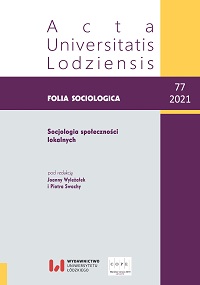Knowledge of one’s own place of living and involvement in local matters with their determinants on the example of a rural community
DOI:
https://doi.org/10.18778/0208-600X.77.05Keywords:
knowledge, action, rural areas, local community, smart villageAbstract
Changes currently taking place in rural areas in Poland are in line with the concept of “smart villages”, which emphasizes the importance of knowledge and innovative activities for the functioning of contemporary rural local communities and the development of rural areas. Referring to the issue of the local community, the article presents the image of the inhabitants of the village of Czarny Las, paying attention to the specificity of this community. In the empirical dimension, the main goal of the authors is to verify the thesis about the dependence between knowledge about one’s own town place of living and involvement in local matters on the example of a specific rural community, as well as to determine the factors affecting both dimensions. For this purpose, indicators concerning the individual knowledge and commitment of the inhabitants of the village of Czarny Las in the commune of Grodzisk Mazowiecki, were created and used. Age, sex, education, time of residence in the examined town and formal registration status were assumed as predictors of both knowledge about one’s own village and involvement in its current affairs. In order to determine the statistical significance of the predictors of the inhabitants’ knowledge about the village and their involvement in it, the multiple regression analysis was used.
References
Bielska A., Stańczuk-Gałwiaczek M., Sobolewska-Mikulska K., Mroczkowski R. (2021), Implementation of the smart village concept based on selected spatial patterns – A case study of Mazowieckie Voivodeship in Poland, „Land Use Policy”, vol. 104, May https://doi.org/10.1016/j.landusepol.2021.105366
Google Scholar
DOI: https://doi.org/10.1016/j.landusepol.2021.105366
Błońska E., Murzyn T.J., Obidziński A., Od Czarnolesia do Czarnego Lasu, czyli o powstawaniu tożsamości lokalnej, Urząd Miejski w Grodzisku Mazowieckim, Czarny Las.
Google Scholar
Boguszewski R., Herudziński T. (2019), Funkcjonowanie współczesnych społeczności lokalnych na przykładzie wsi Czarny Las. Raport z badań, maszynopis, Pracownia Badań Społecznych Szkoły Głównej Gospodarstwa Wiejskiego, Warszawa.
Google Scholar
Hałasiewicz A. (2020), Koncepcje ożywienia i wzmocnienia rozwoju wsi, [w:] J. Wilkin, A. Hałasiewicz (red.), Polska wieś 2020. Raport o stanie wsi, Wydawnictwo Naukowe Scholar, Warszawa.
Google Scholar
Herudziński T. (2020), Zmiany na obszarach wiejskich w Polsce – percepcja, wiedza i zaangażowanie „starych” i „nowych” mieszkańców wsi, „Rocznik Lubuski”, t. 46, cz. 2, s. 77–88.
Google Scholar
Murzyn T.J. (2020), Zarys dziejów – wieś Czarny Las w latach 1850–1990, [w:] E. Błońska, T.J. Murzyn, A. Obidziński, Od Czarnolesia do Czarnego Lasu, czyli o powstawaniu tożsamości lokalnej, Urząd Miejski w Grodzisku Mazowieckim, Czarny Las.
Google Scholar
Skakelja N. (red.) (2018), Innowacje cyfrowe i społeczne w kontekście usług na obszarach wiejskich. Broszura o przykładowych projektach, Europejski Fundusz Rolny na rzecz Rozwoju Obszarów Wiejskich, European Network for Rural Development, Urząd Publikacji Unii Europejskiej, Luksemburg.
Google Scholar
Wilkin J. (2020), Zróżnicowana i zmieniająca się polska wieś, [w:] J. Wilkin, A. Hałasiewicz (red.), Polska wieś 2020. Raport o stanie wsi, Wydawnictwo Naukowe Scholar, Warszawa.
Google Scholar
Downloads
Published
How to Cite
Issue
Section
License

This work is licensed under a Creative Commons Attribution-NonCommercial-NoDerivatives 4.0 International License.










